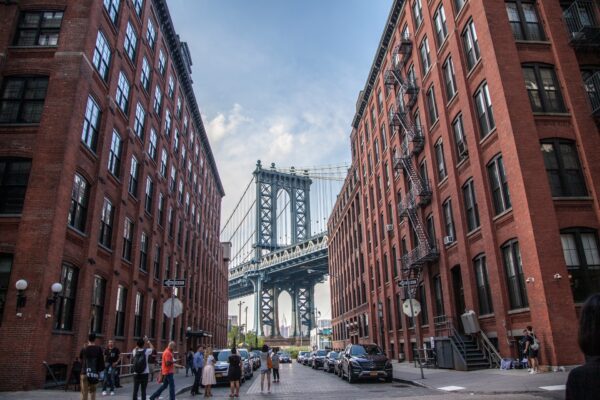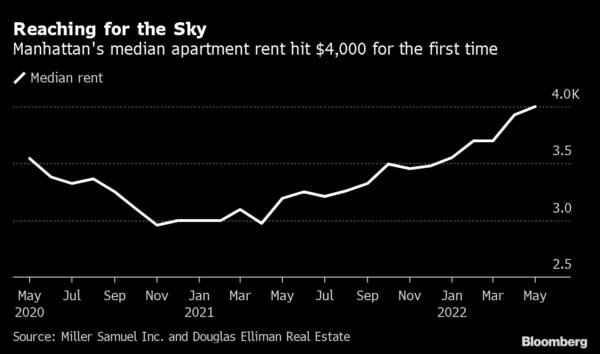By Alice Kantor
Big cities are alluring again, but there’s a problem for people who are looking to move back: it’s become prohibitively expensive.
In Manhattan, median apartment rents hit $4,000 for the first time ever in May, while home prices surged nearly 11% in the first quarter compared to a year earlier. The story is similar in many other major global cities, where living costs are surging alongside prices for everything from food to gas. Rents in London’s core jumped 16% in May year-over-year, and housing prices rose 7.6%.

This means those who left during the pandemic and want to move back — some because they miss big-city life, others because their workplaces are demanding it — are finding they simply can’t afford it, or have to stretch their budget to make it happen.
Dana Twito, a 32-year-old real estate broker, left the New York City area in April 2021 to move to Miami because she was worried about rising crime rates and felt suffocated by pandemic restrictions. At the time, it made financial sense for Twito, her husband and her daughter to sell their condo in Bergen County, New Jersey, for $980,000 and buy a townhouse in Miami for $600,000. But work has required her to be in New York more often as the pandemic has eased, making her regret the move.
“Florida is great if you want to come on vacation, but New York is New York,” said Twito, who now flies back every week to sell real estate in the city. She’s hoping to find a house for $800,000, but inventory is so low and prices are so high that all she can find are places that need to be torn down or renovated completely, she said.
Priced Out
New York City saw more than 130,000 households permanently flee between March 2020 and June 2021 as the pandemic ravaged the city, according to a study by the Comptroller’s Office using US Postal Service data. The trend reversed in the second half of 2021, and a recent survey found that more people are moving into Manhattan than before the pandemic, creating a surge in demand that’s causing rents and home prices to spike.
“There’s been a huge influx of people who left the city, who are now coming back,” said New York broker Edward Joseph from Christie’s International Real Estate. “It’s very hard for some people to afford anything.”

Rebecca Goldberg Brodsky sold a two-bedroom in south Brooklyn for $430,000 and moved to Princeton, New Jersey, in the spring of 2020 with her husband and child, as they couldn’t stand being cooped up in the city during the pandemic. Finding they missed the hustle and bustle, they moved back in September, buying a three-bedroom in north Brooklyn for $1 million. Their monthly mortgage is a lot higher and more stressful to deal with, but they still feel they lucked out as prices kept climbing after that.
‘Constant Worry’
Relocations to London from elsewhere in the UK surged in the second half of 2021, according to moving company Shiply. For many, this has made it virtually impossible to find the sort of accommodations they could afford before the pandemic.
Amy Parry, 30, is terrified of being asked by her boss to return to the office. She moved into a four-bedroom house in south Wales with her husband and newborn baby three months ago, and has the budget to make the three-hour trip to London about two days a week. The HR advisor said she couldn’t afford a house in London and would consider renting or staying with friends if her boss forced her back.
“There’s this constant worry that my company will force me back to the office full time, or reduce my salary if I live too far,” she said.
Moving back post-pandemic isn’t an easy pill to swallow in Australia either. Melbourne, ranked the fifth-least affordable city in the world, saw rental unit prices increase 12% this March compared to the same month last year and house prices jump 10% compared to a year ago.
Luke Saville, 31, moved out of Melbourne in September to be closer to his father. He and his wife bought a A$504,000 ($348,000) three-bedroom house in Euroa, a town two hours away from the city, but the family of four moved back to Melbourne last month when the real estate agent realized he needed to be closer to his office for work and couldn’t spare the lengthy daily commute.
He lost out in the process, he said, as rental prices in the city skyrocketed. He’s now paying A$800 a week for a three-bedroom cottage in a suburb farther out of the city, compared to the weekly A$550 he used to pay for his two-bedroom house in Malvern, east of Melbourne.
Saville, who wanted to buy a A$1.5 million house in 2020, now says he’ll need to wait five years to be able to afford a similar property as prices exploded.
“We’ve just been pushed further out of the city because of Covid,” he said.
More stories like this are available on bloomberg.com.




